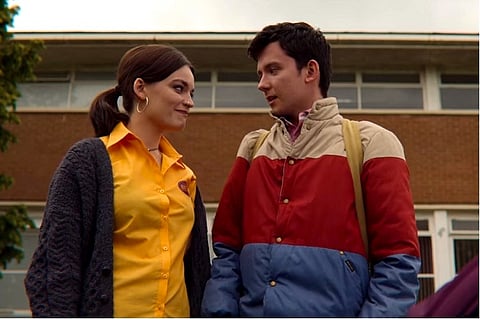

Think teenagers and sex, and the image that probably comes to mind is that of two cis heterosexual, handsy adolescents who can’t keep their hands off each other. It could almost be comical. But the image is very limited in its scope, and excludes a large variety of teen sexual experiences. Enter Netflix’s original series Sex Education, which breaks many of these ‘typical’ images with its diversity and its easy, aspirational inclusiveness. While the first four episodes have been directed by Ben Taylor, the last four are by Kate Herron. Each episode is around the 50-minute mark.
The show, on the face of it, is about high school kids and their coming to terms with sex and intimacy, but really, it deals with much more, and has something for everybody. The second season of the acclaimed series dropped on January 17. And the makers have ensured that the show retains its reputation as one of the most sex-positive drama-comedies to come out recently.
In the second season, the protagonist – 16-year-old Otis Milburn (played by Asa Butterfield) – is back to Moordale for a new term. And with his partner in running the ‘sex clinic’, Maeve, kicked out of school in Season 1, it appears that things might just go back to being normal for Otis, who now has a girlfriend and has made up with his best friend, Eric. However, as things unfold, Otis’s mother – a sex therapist – is called to school to give actual sex education, much to Otis’s embarrassment. Things get complicated further when Maeve, who he had feelings for, returns to school too.
The show retains most of the elements from Season 1 – the genuine humour, excitement, confusion and nervousness of first loves and intimacy, and the complexities of the teenage mind. A commendable quality of the show is that it is not just the main characters’ stories that are told well. The stories of each of the characters, no matter how much screen time they are given - right from the school snob Ruby, to eccentric alien erotica writer Lilly, to the guy everyone is too embarrassed to have had sex with – are told in a way that normalises their struggles without making them seem trivial.
In one sequence, for example, we see a motley group of girl students grouped together in detention. They are told to come up with one thing that binds them as women. Initially it appears that the group has nothing in common, except for their exasperation at having been put to detention with people they dislike. The popular girl has nothing in common with the nerd and the rebel, the rebel doesn’t like chocolate or shopping like everyone else, and the ‘weird’ one doesn’t like most things that everyone else agrees on. Finally, in a vulnerable and empowering scene, they all realise that they’ve all been touched non-consensually – an experience that would echo with most women everywhere.
Also worth mentioning is how Season 2 takes forward the story of Maeve (played by Emma Mackey) and Adam. While we learn more about Maeve’s complicated history with her absentee mother who was a drug addict, Adam is arguably one of the most poignant characters on the show. Played by Connor Swindells, Adam has fewer dialogues compared to other characters. However, the portrayal of his struggle with his sexuality, his unaffectionate father, and the deep-seated internalised homophobia with all its complexities, is praiseworthy.
Sex Education, like many new Netflix shows, has a diverse cast that normalises female sexual desire, kinks, single-parent families, same-sex couples, and non-heteronormative genders and sexual experiences. It also talks about more complex issues like stigma around STIs and sexual assault without getting preachy.
In many ways, the show does exactly what its name says – it educates the audience about sex and sexuality in a way many academic curriculums fail. It humanises the experiences, because after all, sex is not as sanitary and dry as the word ‘intercourse’. More often than not, it’s embarrassing, awkward and funny before it gets hot and heavy; and it’s about people, their desires, and their relationships with themselves and others around them.
Shows like Sex Education are a reminder that being a teenager can be really stressful and difficult. It is easy to belittle adolescents, but living their lives is not easy. Apart from the barrage of emotions and physical changes, there’s a whole lot going on – new relationships, peer pressures, family issues, performance anxiety, and questions about the future. And while things may be first realised and felt during adolescence, there is something very universal about them. Perhaps this is why shows like Stanger Things and Sex Education, or works like Harry Potter or Hunger Games before them, despite their teen protagonists and their other overarching themes of drama or fantasy fiction, move older audiences too.
Disclaimer: This review was not paid for or commissioned by anyone associated with the series/film. TNM Editorial is independent of any business relationship the organisation may have with producers or any other members of its cast or crew.